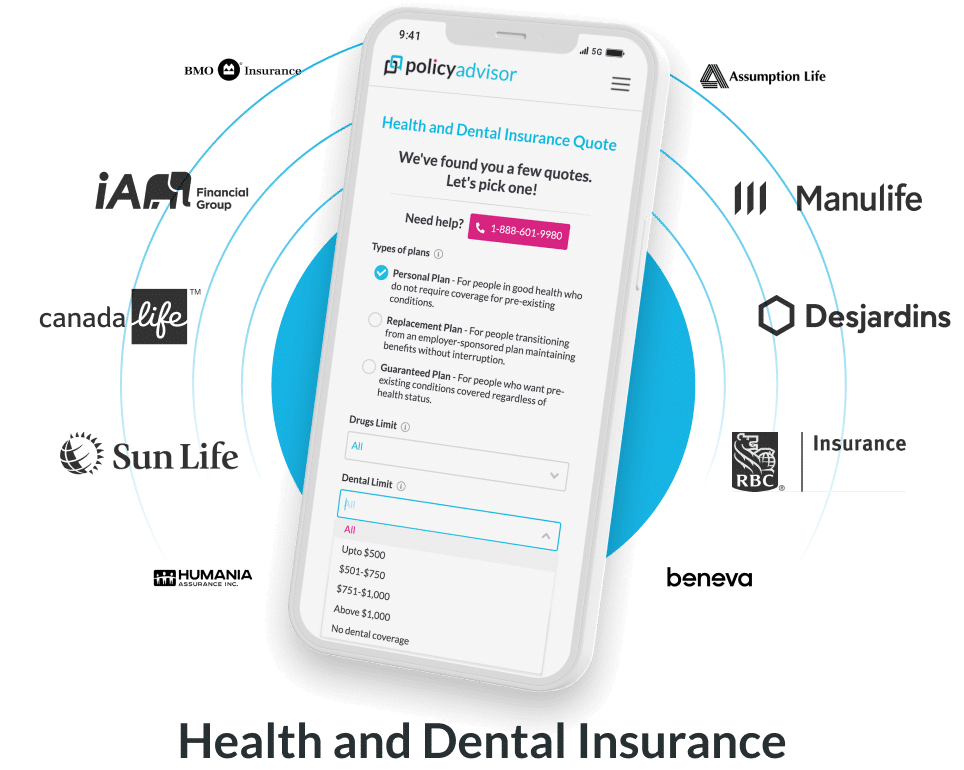- The Canadian Dental Care Plan (CDCP) provides essential dental care to families with an adjusted family net income of less than $90,000
- It covers cleanings, fillings, extractions, root canals, dentures, and periodontal care
- CDCP excludes implants, most orthodontics, and cosmetic procedures, leaving gaps in care
- Private dental insurance fills these gaps, offering broader provider networks, advanced procedures, and flexible plans
- Top providers like Manulife, Sun Life, Green Shield Canada, and Blue Cross offer entry-level plans, though rates vary by province and age
The Canadian Dental Care Plan (CDCP) helps lower and middle-income Canadians without private benefits access essential dental care. In 2022, 25.9% of Canadians skipped a dental check-up; among those without insurance, 47.4% delayed oral care due to high costs (Statistics Canada, 2024).
The CDCP helps cover routine and preventive dental services, but not everything is included. Coverage levels and service approvals vary, and many procedures may still require out-of-pocket payment.
In this guide, you will learn what the Canadian Dental Care Plan (CDCP) covers, what is excluded, and what to do if you do not meet the eligibility requirements or lose coverage.
What is the Canadian Dental Care Plan (CDCP)?
The Canadian Dental Care Plan, also known as the CDCP, is a federally sponsored dental care plan that provides dental care and oral health services to Canadians with limited incomes who do not have private health insurance or lack access to basic dental care.
Rolled out in phases, it aims to provide dental insurance to low and middle-income families, people with disabilities, seniors, and children. As of 2025, the plan has expanded to more Canadians, improving access to affordable care nationwide.
How does the Canadian Dental Care Plan (CDCP) work?
The Canadian Dental Care Plan (CDCP) is overseen by Health Canada and administered by Sun Life Financial which handles enrollment, claims processing, direct billing, fee schedule reimbursements.
This program allows dentists to participate voluntarily and only CDCP-registered providers and dentists can bill the plan according to the national fee schedule. If your dentist isn’t enrolled, you may need to pay upfront and submit a claim for reimbursement. However, reimbursement applies only to eligible services and up to the CDCP fee schedule. Participating providers must follow the CDCP fee schedule, while non-participating providers may charge more, and you pay the difference. Also, not all non-participating dentists assist with claim paperwork.
Understanding how the CDCP works can help in planning your oral health care needs and maximizing the benefits provided.
Who qualifies for the CDCP?
The CDCP applies to Canadians who meet specific eligibility criteria. Understanding these requirements helps you decide whether you need additional private dental coverage to meet your oral care needs.
To qualify for the CDCP:
- You must be a Canadian resident, have filed a tax return in the previous year, and hold a valid Social Insurance Number (SIN)
- Your adjusted annual family income must be less than $90,000
- You should not have or have access to any private dental insurance, including through group or pension plans, on the date of application
- You (your spouse/partner, if applicable) must have filed a tax return in the previous year
CDCP coverage in 2026
The CDCP provides coverage for essential dental care services in Canada, including restorative treatments, preventive services, oral surgery, periodontal care, and dentures.
CDCP coverage in 2026 includes:
- Restorative care, such as fillings and root canals
- Preventive services, including cleanings and fluoride treatment
- Oral surgery, such as tooth extractions
- Partial and full dentures
- Periodontal services, including scaling and root planing
- Limited orthodontics for medically necessary cases (expanded requests available starting 2025)
How much does the CDCP cover?
The CDCP determines coverage based on adjusted family net income. Families with lower incomes receive higher coverage, while coverage decreases as income increases.
Here’s the coverage breakdown:
- Annual income below $70,000: CDCP pays 100% with 0% co-pay required
- Annual income $70,000–$79,999: CDCP pays 60% with 40% co-pay required
- Annual income $80,000–$89,999: CDCP pays 40% with 60% co-pay required
Why does personal dental insurance coverage matter in Canada?
Personal dental insurance matters in Canada because the CDCP has coverage limits and exclusions. While the Canadian Dental Care Plan improves access to dental care, it does not cover every procedure or cost, leaving gaps that many Canadians still need to manage.
Canadians who are not eligible for CDCP can purchase private dental insurance to meet their dental care needs and avoid paying out of pocket for essential services.
| Aspect | Personal/private dental insurance | Canadian Dental Care Plan (CDCP) |
| Eligibility | Anyone who can pay premiums or has workplace access can enroll | Only households under the specified income limit and without private plans qualify |
| Dentist choice | You can choose almost any licensed dentist, including long-time family providers | You must find a dentist registered with CDCP and willing to accept it |
| Coverage flexibility | You can tailor plans, including higher limits, orthodontics, implants, or advanced restorative care | The plan provides standardized coverage focused on basic, essential services |
| Advanced treatments | Many plans include crowns, bridges, implants, or orthodontics at enhanced tiers | The plan limits several higher-end treatments; some need approval or are not covered |
| Predictability | You know your premiums and coverage percentages each year | Coverage and co-pays vary with income and government rules |
| Access and experience | Plans integrate smoothly with dental offices and claims systems | Not all dentists participate, which may restrict where and how you get care |
| Long-term planning | You can plan major work over several years within known annual maximums | You may struggle to plan complex, multi-year treatments if coverage is restricted |
Understanding CDCP exclusions helps you decide how much personal dental coverage you need to ensure comprehensive protection and continuous access to required dental treatment.
CDCP limitations and exclusions
The CDCP has coverage limitations and excludes several dental services, which makes private dental insurance important for broader protection. It does not cover dental implants, cosmetic procedures (e.g., veneers, whitening), and most orthodontics (unless medically necessary). Several covered items also have frequency caps and may require preauthorization.
The financial impact is significant. A porcelain crown typically costs $900-$1,600+, depending on the province. Under the CDCP, coverage for crowns is limited, regulated by the fee schedule, and requires preauthorization in select cases. By contrast, private dental plans often cover 50–80% of major restorative work on enhanced tiers.
| Type of services | CDCP coverage | Private dental insurance coverage |
| Fillings and extractions | Yes | Yes |
| Basic cleaning and exams | Yes | Yes |
| Implants | No | Available in comprehensive plans |
| Bridges and crowns | Covered in limited cases; preauthorization required | Available in comprehensive plans |
| Cosmetic procedures | No | Available in comprehensive plans |
| Orthodontics | Only if medically necessary – including for children under 13 | Available in comprehensive plans |
Note: Coverage varies by insurer and plan tier; waiting periods and maximums may apply
Private dental insurance vs. CDCP: A comprehensive comparison
Comparing private dental insurance with the CDCP helps you evaluate your options and maximize savings. Households with an annual income below $90,000 are eligible for the CDCP and can access essential dental care services through the program.
Private dental insurance offers flexible coverage, fixed monthly premiums, and a wider range of benefits, as long as the premiums are paid regularly. Understanding the differences between CDCP and private dental plans helps you choose the option that best meets your needs.
CDCP vs. private dental insurance
| Factors | CDCP | Private dental insurance |
| Annual premium | No premium. Co-pay of 0–60% applies. You don’t pay above the CDCP fee schedule with participating providers. With non-participating providers, you may owe the difference | Monthly premiums; co‑pays and annual maximums may also apply depending on the plan design |
| Scope of coverage | Basic dental services | Basic and major dental including orthodontics depending on the plan |
| Access to providers | Direct billing is available only through CDCP-registered dentists. Members can see non-participating dentists by paying out of pocket and claiming eligible services | Most plans allow access to any licensed dentist, though some have preferred provider networks or reduced reimbursement for out-of-network care |
| Eligibility criteria | Family income must be $90,000 or below | Available to everyone with provincial health coverage like OHIP |
Top providers for the best dental insurance in Canada?
Top Canadian insurers such as Manulife, Sunlife, Greenshield, and Blue Cross provide private coverage options for various coverage needs.
Before buying a dental insurance plan, compare quotes to make an informed decision. Our experts at PolicyAdvisor can help you compare plans and choose comprehensive coverage that fits your budget. Our advisors remain available even after you obtain coverage and can support you with insurance-related questions.
How to choose the cheapest personal dental insurance plan?
Choosing the cheapest personal dental insurance plan in Canada requires comparing coverage options, costs, and provider networks to make sure you receive the benefits you need at an affordable price. Various insurers offer dental care plans designed for different needs, so comparing dental insurance quotes helps you select the most suitable option.
You can connect with our licensed advisors at PolicyAdvisor who can help you compare plans and choose the dental coverage that aligns with your budget. Understanding the key factors that influence coverage helps you make an informed decision.
Things to consider when buying private dental coverage in Canada
Before buying private dental insurance, consider factors such as cost, provider networks, included services, waiting periods, and additional benefits to ensure you choose a cost-effective dental plan.
- Coverage type: Dental plans typically include basic, preventive, and major services. Basic covers common treatments like root canals and cavities, preventive includes cleanings and check-ups, and major covers complex procedures
- Annual limits and maximums: Most plans include yearly limits. Any costs beyond the limit must be paid out of pocket
- Network providers: Many plans cover visits to licensed dentists, but reimbursement may be lower if you choose an out-of-network provider
- Waiting period: Some plans include waiting periods ranging from a few months to a year for specific services. Knowing the waiting period helps you plan coverage based on urgency
- Additional benefits: Look for plans that offer added value, such as wellness programs or telehealth consultations. You may also bundle dental, vision, or drug coverage to enhance benefits at a lower cost.
How to choose the best dental insurance in Canada?
Choosing the best dental insurance in Canada starts with evaluating your dental care needs and budget. Knowing your requirements helps you select a plan that provides comprehensive coverage at an affordable cost.
Step-by-step process to choose the best dental plan
- Assess your dental care needs, including those of your family, to determine the benefits you require and your budget
- Speak to an expert licensed advisor at PolicyAdvisor to compare premiums, deductibles, and co-payments to see which plan suits your financial situation
- Complete the application and submit it with the necessary documents for verification
Our PolicyAdvisor experts will help you compare dental insurance quotes and choose the most suitable coverage. Our advisors also support you after purchase and can help with any insurance‑related questions.
Frequently Asked Questions
Is the Canadian Dental Care Plan free for low- and middle-income families?
No, the CDCP is not entirely free. Families with an annual income below $70,000 receive 100% coverage of the CDCP fee schedule. Patients must pay any amount their dentist charges above the schedule. Those with annual incomes between $70,000 and $79,999 pay a 40% co-payment, and families earning $80,000–$89,999 pay a 60% co-payment.
Can I use the Canadian Dental Care Plan if I have an employer’s dental insurance?
No, you cannot access the CDCP if you have private dental coverage as the CDCP eligibility criteria requires one to not have access to any dental coverage.
How do I find a dentist who accepts the Canadian Dental Care Plan?
Find CDCP-registered dentists on the Health Canada website. You can also check with local dental clinics or community health centres to see if they participate in the CDCP.
How do wait times differ between CDCP and private dental coverage?
CDCP coverage starts on your benefit effective date, and most essential services are available immediately. Some procedures, such as crowns or dentures, may require preauthorization, but there is no general waiting period once you’re enrolled. Private dental plans often work differently. Many insurers apply 3-12-month waiting periods for major services like crowns, root canals, dentures, or orthodontics. Some plans may waive waiting periods during open-enrollment windows or for employees who enroll when first eligible. If you anticipate major work such as a crown or root canal, it’s best to enroll in a private plan before the treatment plan is finalized so you can avoid delays and maximize reimbursement.
Does the CDCP cover orthodontics and braces?
CDCP covers orthodontics only if medically necessary to correct severe dental issues. Expanded requests become available in 2025 for eligible cases. Braces and cosmetic procedures remain excluded; consider comprehensive private dental plans for these services.
How often can I renew my CDCP coverage?
CDCP eligibility is reassessed each year automatically based on your tax filings. You do not need to submit a new application unless your circumstances change.
Can you combine the Canadian Dental Care Plan (CDCP) with private dental insurance in Canada?
No, you cannot combine the Canadian Dental Care Plan (CDCP) with private dental insurance. CDCP rules focus on whether you have access to private dental coverage. If you or your family have access to any private plan through work, school, or a group benefit, you are not eligible for CDCP. If your access ends (for example, because of a job change, contract end, or retirement), you may qualify starting from the date your access ends, as long as you meet the income criteria. You can only apply if you no longer have access to private dental insurance on your application date. If you obtain private coverage after joining the CDCP, you must notify the program, and your eligibility may end. The CDCP also does not coordinate claims with private insurance.
What coverage and limitations does the CDCP have?
The CDCP covers preventive and basic dental treatments, including exams, cleanings, X-rays, fillings, and some oral surgeries. CDCP covers services up to set maximums, with co-payments of 0–60% based on household income. It does not cover cosmetic dentistry or most orthodontics, except for medically necessary cases. Covered services have no waiting periods.
Why is private dental coverage still valuable?
Private dental insurance remains valuable because it fills gaps that the Canadian Dental Care Plan (CDCP) does not cover. It provides benefits for cosmetic procedures, specialized treatments such as orthodontics and periodontics, and helps coordinate coverage for all family members across different age groups.
What changed for the CDCP in 2025?
Starting in 2025, CDCP applications open progressively for various age groups, targeting adults 18–64 who do not have private coverage. Full rollout ensures more Canadians have access to affordable dental care, while eligibility rules and coverage limits remain clearly defined by the federal government.
The Canadian Dental Care Plan (CDCP) is a federal program providing basic, affordable dental coverage for eligible low and middle-income families without private insurance. It covers essential services such as fillings, cleanings, extractions, root canals, dentures, and periodontal care. CDCP excludes implants, most orthodontics, and cosmetic procedures. Private dental insurance suits those ineligible for CDCP (e.g., incomes over $90K or with group benefits) or needing advanced treatments like implants.
Source: Statistics Canada. “Dental insurance is a key predictor of oral health care access and use among Canadians.” The Daily — Health Reports, April 2024. Published April 17, 2024.






